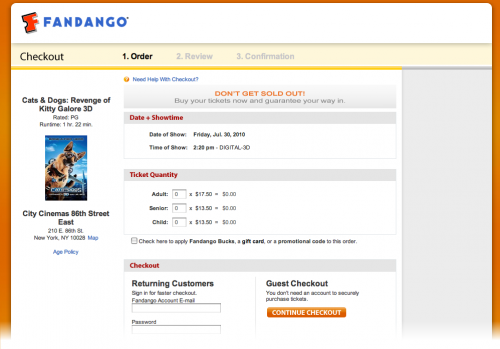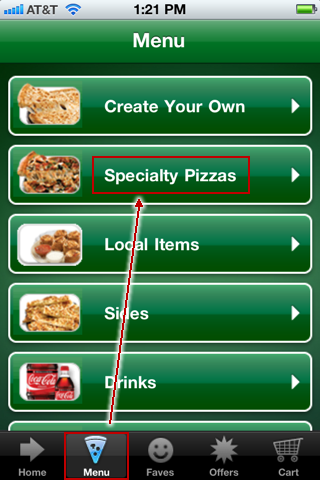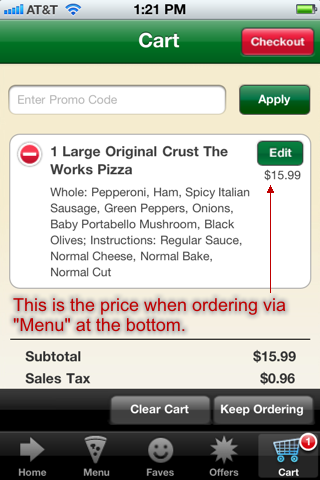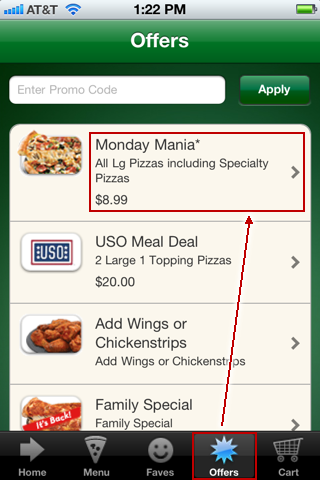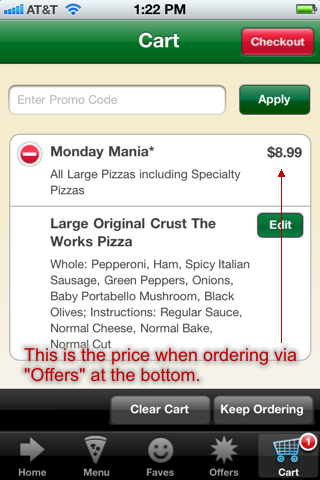Price Comparison Prevention
From Dark Patterns
Contents[hide] |
Definition
The practice of hiding or obfuscating price information, so that users find it hard or impossible to compare items based on price.
Example: fandango.com (July 2010)
On fandango.com you can't easily choose films by price. You have to select a date, and select a specific time in order to see the ticket price (shown below). Price comparison involves numerous clicks (aka "pogo sticking"), so it is easier to forget about the price differences and select your film showing on other merits.
Example: directline.com (July 2010)
UK insurer Direct Line (July 2010) does not allow its products to appear on price comparison websites. This 2007 article in The Telegraph gives details. To quote:
Richard Mason, a director of moneysupermarket.com, says Direct Line's tactics smack of sour grapes. "Sites such as ours have changed the way people shop for insurance and as a result Direct Line has lost market share," he says, pointing out that websites such as moneysupermarket.com would be happy to include Direct Line's prices in their searches. "We have the technology to access a Direct Line quote for every consumer. But when we try to include them for comparative purposes we are threatened with legal action."
Example: www.tfl.gov.uk/oyster (May 2010)
Transport for London's pay as you go transport scheme promises "Our aim is to ensure that Oyster always charges the lowest fare. Where it doesn’t we will refund the difference." [1]
The myriad of different prices [2] and types of journey (tube, national rail, through journeys - [3]) put most people off from actually working out how much their journey would cost with each leg paid separately. The combination of complex rules and pricing, along with a price promise hide the fact that in many cases it would work out cheaper to use two Oyster cards instead of one.
Three common situations catch people out:
1. To peak or not to peak: If you travel part peak, part non peak, part National rail, part tube, it will be cheaper to have two Oyster cards and use one for the peak, one for the off peak part of your journey.
2. Two zones, one station: If you travel via an interchange which is in two zones, such as Vauxhall (in zone 1 and 2), it will again be cheaper to use two Oyster cards - one for a journey within zone 1, another not touching zone 1.
3. One peak, and your cap shoots up: If you travel on only one peak journey in a day, that will bump your daily price cap up to the peak travelcard, which can be double the price of an off peak one. By doing a £1.80 peak single in zone 1 on one Oyster in the morning peak, then unlimited off-peak travel between zones 1 to 6 on a separate Oyster saves £5.50 a day, compared to just using one Oyster card.
TfL do provide an alternative fare calculator tucked away within the single fare calculator: [4] but it's easily missed, and ignores the impact of doing part of the journey peak and part of the journey off peak.
In a beautiful moment of irony, calling the 0845 number given in the leaflet to enquire about the price promise, the call centre agent advised against having two Oyster cards as "you might get confused" (examples provided by @yousability).
Example: Papa Johns iPhone App (November 2011)
If you click on "Menu" along the bottom, and then "Specialty Pizzas" to order a large "The Works" pizza, you’ll pay $15.99 for the pizza.
However, if you click on "Offers" along the bottom, you’ll find that you can order the exact same pizza for only $8.99.
In any reputable brick-and-mortar store, the person behind the counter will make a customer aware of specials that apply to the product they are purchasing and charge them the special price. It’s reasonable to expect the same thing from technology-based transactions. However, Papa John’s makes it easy for someone to pay full price even though a special is available for them. And a person who’s fooled into paying full price will likely never know that they were fooled in the first place.
